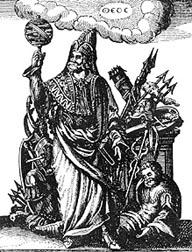
HermÍs
(prehistoric/mythic)
by T. Apiryon
Copyright © 1995 Ordo Templi Orientis. All rights reserved.

The Arkadian messenger god. Known in Roman mythology as Mercury. He was the son of Zeus and Maia, born on Mount Cyllene. He was the father of Echion, Autolycus and Daphnis, and, by some accounts, of Pan. He was a deity of travel, trade, commerce, ingenuity, manual skill, athletics, eloquence and oratory, of the wind and of speed; the patron of shepherds, herdsmen, athletes, orators, writers, thieves, merchants, travelers, prophets, soothsayers and magicians. HermÍs corresponds to the Egyptian god Thoth or Tahuti, as the inventor of writing; and, as HermÍs Psychopompos, to Anubis as guide of the souls through the underworld.
HermÍs is also the god of stones, cairns and boundaries, and was associated with certain phallic stone monuments called herms. HermÍs was usually depicted as a youthful, athletic male deity, unclad or clad only in a short chlamys, with a round, winged hat and winged sandals, and bearing the Caduceus (a rod, sometimes winged, with twining ribbons or snakes) and a pouch. One Latin title for HermÍs was "the universal column supporting all things." His sacred animal was the crane.
HermÍs is often portrayed as a prankster, his most famous prank being the theft of Apollo's cattle on the day of his birth. When Apollo discovered the theft, HermÍs placated his anger by offering to return the remaining cattle (he had sacrificed two of them to the twelve gods, including himself), and singing Apollo's praises while accompanying himself on the lyre, which he had just invented. Apollo was so taken with the beauty of the music, that he offered to trade the stolen cattle for the lyre. HermÍs accepted the offer; then cut some reeds, bound them together and played a few more tunes for Apollo on his newly-invented shepherd's pipe. Apollo was again enchanted by the music, and offered to trade his golden herdsman's staff for the pipe. HermÍs reluctantly accepted the offer, but only on the condition that he be instructed in the art of prophecy as well.
Apollo took HermÍs to Olympus, where HermÍs was accepted among the gods. Despite his malicious pranks (or, perhaps, as a result of them), he was the only one of Zeus's illegitimate children who immediately found favor with HÍra. Zeus proclaimed him his personal herald, and invested him with the insignia of his office: his round hat, his winged sandals, and a winged herald's staff twined with white ribbons. HermÍs pledged that, as herald of the Most High, he would give up telling lies; but he could not promise always to tell the whole truth.
HadÍs also proclaimed HermÍs his herald, to summon and conduct the souls of the dying to the underworld. As a sign of HermÍs's association with HadÍs and his role as Psychopompos (conductor of souls), the white ribbons on his herald's staff were transformed into twining serpents, the ancient emblem of dead souls.
HermÍs developed the musical scale, and assisted the three Fates to compose the Alphabet. He created the science of Astrology, founded the arts of boxing and gymnastics, invented weights and measures, and taught the cultivation of the olive tree and the making of fire by the twirling of a fire-stick.
 HermÍs as a Saint of E.G.C. may also refer to Hermes Trismegistus or
Thrice-Greatest Hermes, the legendary Egyptian founder of Hermeticism,
corresponding to the Egyptian god Thoth. Hermeticism was a non-Christian form
of Gnosticism which emerged in Egypt in the second through fourth centuries
e.v., and which produced a voluminous body literature called the
"Hermetica," including the
Tabula Smaragdina
or
Emerald Tablet of HermÍs
which is the source of the famed magical aphorism, "As above, so
below"; and
The Divine Pymander,
which is included in Section 1 of the A:. A:. reading list. Hermeticism had
a considerable influence on the development of Alchemical philosophy.
HermÍs as a Saint of E.G.C. may also refer to Hermes Trismegistus or
Thrice-Greatest Hermes, the legendary Egyptian founder of Hermeticism,
corresponding to the Egyptian god Thoth. Hermeticism was a non-Christian form
of Gnosticism which emerged in Egypt in the second through fourth centuries
e.v., and which produced a voluminous body literature called the
"Hermetica," including the
Tabula Smaragdina
or
Emerald Tablet of HermÍs
which is the source of the famed magical aphorism, "As above, so
below"; and
The Divine Pymander,
which is included in Section 1 of the A:. A:. reading list. Hermeticism had
a considerable influence on the development of Alchemical philosophy.
References:
Barrett, Francis;
The Magus, or Celestial Intelligencer
[1801], Citadel, Secaucus, NJ 1967
Bullfinch, Thomas;
The Age of Fable,
1855; republished by Mentor, New York 1962
Forlong, J.G.R.;
Faiths of Man, a Cyclopaedia of Religions
[Bernard Quaritch, 1906], University Books, NY 1964
Graves, Robert;
The Greek Myths, Vol. I,
George Braziller, NY 1959
Guirand, F.; "Greek Mythology" in
The New Larousse Encyclopedia of Mythology,
Hamlyn, NY 1959/1968
Mead, G.R.S.; "The Gnosis of the Mind" and "The Hymns of
Hermes" in
The Complete Echoes from the Gnosis
[1906-1908], Chthonios Books, Hastings 1987
Mead, G.R.S.;
Thrice-Greatest Hermes, Studies in Hellenic Theosophy and Gnosis,
The Theosophical Publishing Society, London 1906
Ovid;
Metamorphoses,
translated by Rolfe Humphries, Indiana University Press, Bloomington 1955/1973
Puhvel, Jaan;
Comparative Mythology,
Johns Hopkins University Press, Baltimore 1987
Randolph, Paschal Beverly;
Hermes Mercurius Trismegistus: His Divine Pymander,
Randolph Publ., Toledo, Ohio 1889
Yamauchi, Edwin;
Pre-Christian Gnosticism,
Tyndale Press, London, 1973
Zimmerman, J.E.;
Dictionary of Classical Mythology,
Harper & Row, NY 1964
5/9/95
Originally published in
Red Flame No. 2 -- Mystery of Mystery: A Primer of Thelemic Ecclesiastical
Gnosticism
by Tau Apiryon and Helena; Berkeley, CA 1995 e.v.